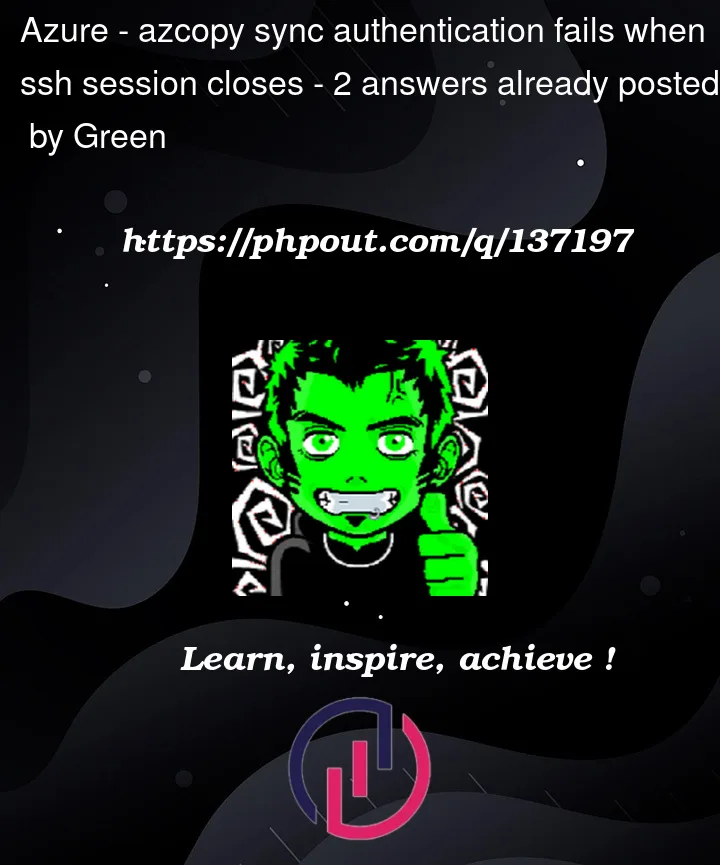I am working on automating the NFS filesystem sync from azure vm to a blob storage account which I am planning to run through the crontab
I am having authentication issues when script is running in the background, the azcopy sync errors out as soon as the ssh session is closed
#ran the script in this way
nohup ./script &Cannot perform sync due to error: Login Credentials missing. No SAS token or OAuth token is present and the resource is not publicI tried first managed identity which was not working in background then tried principal secret which also had the same issue
here is my script
#!/bin/bash
# Set variables
SRC_BASE_DIR=/shared2/attachments
DEST_BASE_BLOB_URL=https://stgontadapreprodgennlp.blob.core.windows.net/fileattachments
LOG_DIR=/root/.azcopy
LOG_FILE="$LOG_DIR/azcopy_sync_$(date '+%Y-%m-%d_%H-%M-%S').log"
[email protected]
FILESYSTEM_USAGE_THRESHOLD=85
SCRIPT_START=$(date '+%Y-%m-%d %H:%M:%S')
#echo "$DEST_BASE_BLOB_URL"
# Get the client ID, client secret, and tenant ID from the app registration
CLIENT_ID=cfe10752-d606-46f8-a427-ef8956711234
CLIENT_SECRET=kP28Q~rtZrNdW4mU5Z6Ho.sgXbcU5Hq55Kb1234
TENANT_ID=da67ef1b-ca59-4db2-9a8c-aa8d9412345
# Authenticate AzCopy with VM's managed identity
#azcopy login --identity
#azcopy login --service-principal --tenant-id “$TENANT_ID” --application-id “$CLIENT_ID” --client-secret “$CLIENT_SECRET”
export AZCOPY_SPA_CLIENT_SECRET=$CLIENT_SECRET
azcopy login --service-principal --tenant-id $TENANT_ID --application-id $CLIENT_ID
# Iterate over directories starting with /shared2/attachments/as
for src_dir in /shared2/attachments/as*/; do
# Get the directory name (e.g. as01, as02) from the path
src_dir_name=$(basename "$src_dir")
echo "in main directory" $src_dir_name
# Check the filesystem usage before syncing
#echo $LOG_DIR
#echo $LOG_FILE
echo "Filesystem Usage:"$filesystem_usage
echo "Filesystem Threshold:" $FILESYSTEM_USAGE_THRESHOLD
filesystem_usage=$(df -h "$LOG_DIR" | awk 'NR==2{print $5}'|sed 's/%//g')
if ((filesystem_usage >= FILESYSTEM_USAGE_THRESHOLD)); then
echo "Filesystem usage for $LOG_DIR is over $FILESYSTEM_USAGE_THRESHOLD%, removing old log files..." >> "$LOG_FILE"
rm "$LOG_DIR"/*.log
fi
# Iterate over subdirectories under the current as directory
for subdir in "$src_dir"*/; do
# Get the subdirectory name from the path
subdir_name=$(basename "$subdir")
echo "in sub directory $subdir_name and main directory $src_dir_name"
# Construct the source and destination URLs
SRC_URL="$SRC_BASE_DIR/$src_dir_name/$subdir_name/"
DEST_URL="$DEST_BASE_BLOB_URL/$src_dir_name/$subdir_name/"
# Sync the directories with AzCopy
azcopy sync "$SRC_URL" "$DEST_URL" --recursive --log-level=ERROR
echo "Source:"$SRC_URL
echo "Destination:" $DEST_URL
#echo $DEST_BASE_BLOB_URL
done
done
# Log out from AzCopy
azcopy logout
SCRIPT_END=$(date '+%Y-%m-%d %H:%M:%S')
SCRIPT_DURATION=$(( $(date -d "$SCRIPT_END" '+%s') - $(date -d "$SCRIPT_START" '+%s') ))
SCRIPT_DURATION_MINUTES=$(( $SCRIPT_DURATION / 60 ))
echo $SCRIPT_DURATION_MINUTES
# Send email with start and end times, and duration
#echo "Subject: AzCopy Sync Script Completed" | cat - <(echo -e "From: [email protected]: $EMAIL_RECIPIENTn") <(echo -e "AzCopy Sync Script completed.nStart time: $SCRIPT_STARTnEnd time: $SCRIPT_ENDnDuration: $SCRIPT_DURATION seconds ($SCRIPT_DURATION_MINUTES minutes).") | sendmail -tany ideas how to resolve this authentication issue when active session is closed




2
Answers
To ressolve this error, add SAS token as an authentication at the end of blob URL as below. When using SAS token, no need to use az login for authentication.
Goto storage account > containers and generate SAS token.
Select the required permissions and click on generate SAS token and copy the token for later use.
Now add the token to the blob URL in your script as below.
Typically, when it comes to the automated use of AzCopy, when we see failures to detect an OAuth token in the keyring on Linux, the recommendation we provide is to use a one-shot login scheme (AzCopy would log in itself, per command, rather than via the normal set-n-forget scheme). In this case, it looks like the authorizing using service principal auth. In this case, the relevant environment variables for the customer to specify for one-shot login would be AZCOPY_AUTO_LOGIN_TYPE=SPN, AZCOPY_TENANT_ID, AZCOPY_SPA_APPLICATION_ID, AZCOPY_SPA_CLIENT_SECRET